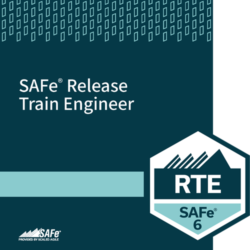SAFe Release Train Engineer (RTE)
Introduction
During this three-day course, participants will gain a good understanding of the role and responsibilities of a RTE in a SAFe company. You will learn how to deliver end-to-end value with an Agile Release Train (ART) and how to build a high-performing ART.
During the training, you will examine the role of RTE in a Lean-Agile transformation through experiental learning. You’ll learn how to facilitate ART processes and execution, coach leaders, teams, and Scrum masters in new processes and mindsets. You will also learn how to prepare, plan and execute a Planning Interval (PI) event. A PI plan ensures alignment across all levels in the SAFe organization. After the training you can take the exam to become a certified SAFe Release Train Engineer.

Learning Objectives
To exercise the role of SAFe® Release Train Engineer, the attendees learn to:
- Apply Lean-Agile tools to create value
- Assist with program and large solution execution
- Foster relentless improvement
- Build a high-performing ART by becoming a servant leader and coach
- Develop an action plan to continue the learning journey
Topics
During the training, the following topics will be covered:
- The roles and responsibilities of the RTE
- Applying SAFe Principles
- Design of the Agile Release Train
- Scheduling a Planning Interval
- Running a Planning Interval
- Fostering Relentless improvement
- Serving the ART
- Continuing your personal Learning Journey
What do you get
As part of the course, you will get:
- Workbook
- Preparation and access to the SAFe® Release Train Engineer (RTE) exam
- One year membership to the SAFe Community Platform
- Course certificate of completion
Participants must attend all days of the course in order to qualify for the exam.
Target audience
This training is intended for:
- Release Train and Solution Train Engineers
- Program and project managers
- Scrum Masters
- Leaders and managers
- Agile coaches
- SAFe Prorgam Consultants (SPCs)
Knowledge and experience
For participants taking the SAFe® Release Train Engineer (RTE) certification exam, it is highly recommended to have the following knowledge and/or experience:
- Hold at least one current SAFe certification
- Participated in at least one ART and one Planning Interval


